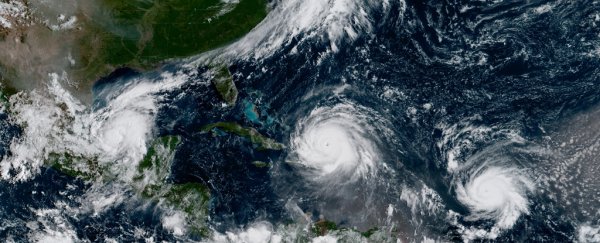A recent presentation by the acting head of the United States' top weather and oceans agency suggested removing the study of "climate" from its official mission statement, focusing the agency's work instead on economic goals and "homeland and national security."
Critics say this would upend the mission of the $5.9 billion National Oceanic and Atmospheric Administration. But the administration disputes that interpretation, saying the presentation did not intend to create a change of direction at a vast agency that tracks hurricanes and atmospheric carbon dioxide, operates weather satellites, manages marine reserves and protects endangered ocean species, among other functions.
NOAA's mission, the agency says, is "to understand and predict changes in climate, weather, oceans, and coasts, to share that knowledge and information with others, and to conserve and manage coastal and marine ecosystems and resources."
But in a presentation at a Commerce Department "Vision Setting Summit" this month, Rear Adm. Timothy Gallaudet, the agency's acting administrator, suggested a change to that mission statement, as well as a new emphasis on tripling the size of the U.S. aquaculture industry within a decade and moving to "reduce the seafood trade deficit."
The new NOAA mission, the presentation said, would be "to observe, understand and predict atmospheric and ocean conditions, to share that knowledge and information with others, and to protect lives and property, empower the economy, and support homeland and national security."
"This presentation is a simplified draft for discussion," said Gallaudet, an oceanographer who has spoken in the past about climate change's effects on the Arctic, in a statement provided by the agency.
"It was not intended to create change in NOAA mission or policy from what it was before. Any interpretation to the contrary is simply inaccurate."
But the proposed removal of language about studying the "climate" and about the managing of coastal and marine resources has aroused considerable ire and concern.
"Elections have consequences," said David Titley, a professor of meteorology at Pennsylvania State University and the former chief operating officer of NOAA.
"This is just another example of where the Trump administration is frankly emphasizing short-term aspects, such as economic growth, and de-emphasizing longer-term challenges, things that will be most apparent after their term, such as impacts on climate, conservation of marine resources."
The presentation was first revealed by the Union of Concerned Scientists, an environmental and science advocacy group.
The new mission statement outlined in the presentation still calls for studying "atmospheric and ocean conditions" — which would be influenced by climate change. And unlike other top Trump administration officials, Gallaudet — a retired Navy rear admiral with a doctorate in oceanography — has not publicly questioned the link between human activity and climate change.
Late last year, at a scientific conference in New Orleans, he introduced a presentation by NOAA scientists of their findings about the fast-changing Arctic.
Gallaudet said then that for those operating vessels in the Arctic, the environment is "the most hazardous [that] they've ever reported" because of changing ice conditions.
His recent presentation lists developing the best weather-prediction model in the world as a top priority but does not highlight its climate programs or initiatives.
It has prompted an outcry from some prominent scientists, including a NOAA administrator under President Barack Obama.
"This unraveling of NOAA's core mission ignores the best interests of the American people, core Congressionally mandated responsibilities, overwhelming scientific evidence, and plain common sense," said Jane Lubchenco, a marine scientist at Oregon State University, in a statement.
"NOAA's core mission integrates the dual mandates of 'observe and predict' with 'conserve and manage,' " Lubchenco added.
"The two functions are highly interdependent. Eliminating multiple parts of both of them guts the whole agency and compromises its remaining functions. Eliminating basic functions of NOAA is foolhardy, ignorant, shortsighted, and very stupid. It's akin to removing multiple vital organs from a body and expecting it to remain healthy."
Lubchenco also said that under the new proposal, some of the agency's congressional mandates could be "blatantly ignored or eliminated."
"It's a focus totally on economic development, and very little on preserving public trust resources," said Andrew Rosenberg, director of the Center for Science and Democracy at the Union of Concerned Scientists and a former regional administrator at NOAA's National Marine Fisheries Service, of the presentation.
"That concerns me, especially with all the progress we've made on fisheries."
Rosenberg said he doubted that U.S. aquaculture could grow dramatically, given all the other current uses of and demands on the coastal real estate. As for lowering the country's trade deficit in seafood, he said, "it's just not going to happen."
In 2017, according to NOAA, the United States imported $21.5 billion worth of seafood products but exported $5.4 billion worth.
It is unclear how the Trump administration could change that. So far, if anything, the president's trade actions may be triggering movement in the opposite direction. China has recently proposed a 25 percent tariff on one major U.S. seafood export, lobsters.
Also unclear is how any proposed reorganization or redirection of NOAA would meld with the ideas of its proposed leader — or whether that individual will even be confirmed by the Senate in time to have a say.
Gallaudet is the acting administrator and was confirmed to be NOAA's second-in-command. He is running the agency because President Trump's nominee, AccuWeather chief executive Barry Myers, remains unconfirmed.
The agency has been without a Senate-confirmed head since Trump took office, even as the administration has proposed steep NOAA budget cuts that have been rejected by Congress.
2018 © The Washington Post
This article was originally published by The Washington Post.
